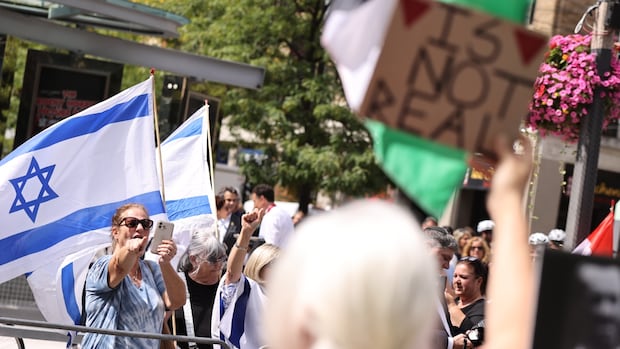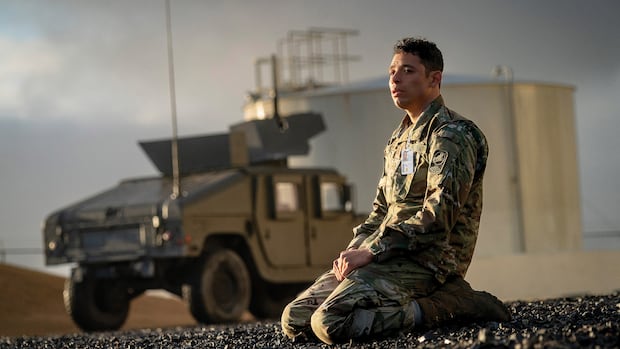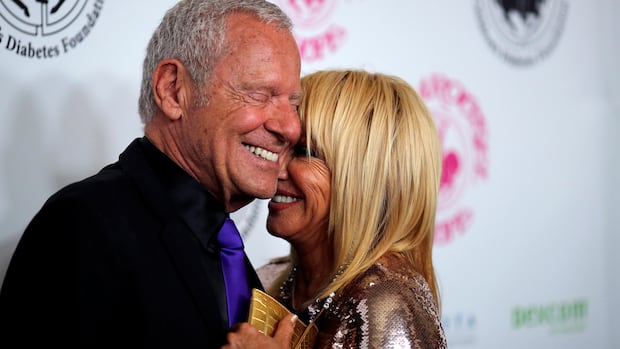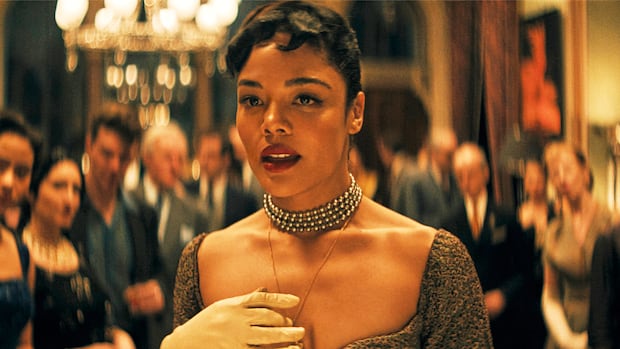Pro-Palestinian and pro-Israeli protesters gathered outside a Toronto International Film Festival venue on Wednesday where viewers were set to watch the world premiere of a documentary about the Oct. 7, 2023, Hamas attacks on Israel.
As both groups waved flags, chanted and held up signs outside the Roy Thomson Hall, police barricades on Simcoe Street kept the groups separated.
The film — titled The Road Between Us: The Ultimate Rescue and directed by Canadian Barry Avrich — tells the story of Noam Tibon, a retired Israeli general, as he tries to save his family during the attack nearly two years ago.
Protesters on opposite sides of the street yelled across the barricades at one another, sometimes hurling taunts or insults. While the protests remained relatively peaceful, one man was arrested for assault.
A pro-Palestinian protester with a microphone spoke about the deaths of civilians happening in Gaza, and called what’s happening there a genocide.
A large police presence could be seen outside the hall, both on horseback and on foot. More officers were positioned inside the theatre as well.
CBC journalists inside the venue said that everyone entering the hall went through a metal detector, had their bags searched and were patted down.
Daniela Maria Bonamico, a pro-Palestinian protester, says she has nothing against the documentary’s subject, his family or their story.
But she said it is “wildly inappropriate” for TIFF to show the film while what she calls a genocide is taking place.
“We don’t need help humanizing the Israeli side. We need help humanizing the Palestinian side who have endured 77 years of ethnic cleansing,” Bonamico told CBC News.
A resolution by the International Association of Genocide Scholars last week said that Israel’s actions in Gaza meet the definition of a genocide. But the International Court of Justice has not yet ruled definitively on whether or not a genocide is taking place.
Another protester and organizer, Naveed Ali, said he takes issue with the film’s centring of the events of Oct. 7 without acknowledging the decades of conflict that predate it.
“This occupation didn’t start on Oct. 7, but this film started on Oct. 7,” Ali said. “You can’t look at that [on] its own, you have to look at the total picture of what’s happening.”
Ali said he was at the protest to educate passersby and film viewers about historical events that occurred in the region.
But Matthew Taub, who was there to attend the screening, noted that the events of Oct. 7 are what kicked off the current war between Israel and Hamas.
“That’s the bottom line that starts this whole story on this war that we’re dealing with right now,” Taub said.
After initially being invited to the festival, the documentary was pulled in mid-August for what TIFF and filmmakers later called “important safety, legal and programming concerns.” That decision sparked massive outcry from the international community, including a number of Jewish groups, especially those in the arts.

The day after it was pulled, TIFF and the filmmakers announced they had been able to work through the issues and re-added the film to the lineup of movies slated for TIFF.
Avrich previously told CBC News that hearing his film had been pulled was incredibly difficult. But ultimately, he said he was excited for audiences to see it and judge for themselves.
He said film festivals should be balanced and show films on both sides of any given issue, adding that “bringing audiences to films sometimes that make them feel uncomfortable” is part of a festival’s job.
Two films about Palestinian stories — The Voice of Hind Rajab and Palestine 36 — are screening at TIFF as well this year.
Just before the screening got underway, Avrich took the stage to thank his partners who made the film possible, as well as the community who fought for the film and TIFF CEO Cameron Bailey. He received a standing ovation in the packed theatre.
The scene inside the theatre wasn’t completely spared from the tense mood outside, though.
Journalist Lisa LaFlamme, who was moderating a question and answer session following the screening, was booed by the crowd when she asked questions about the death toll in Gaza, which has now topped 64,000, and where famine has been declared. Avrich asked the crowd to let the panel answer in response.
Protests at TIFF aren’t new.
On Saturday, pro-Palestinian protesters gathered on festival street in opposition to the Oct. 7 documentary. Protesters in that crowd had similar concerns about the deaths in Gaza and the “art-washing” of the conflict.
Last year, a documentary by a Russian filmmaker, which followed soldiers and medics on the front lines of Russia’s invasion of Ukraine, made headlines. Screenings of that movie were also paused, before the documentary was quietly shown toward the end of the festival.
Ukrainian protesters, including Ukrainian Consul General Oleh Nikolenko, formed a large crowd outside of a screening at the time.







